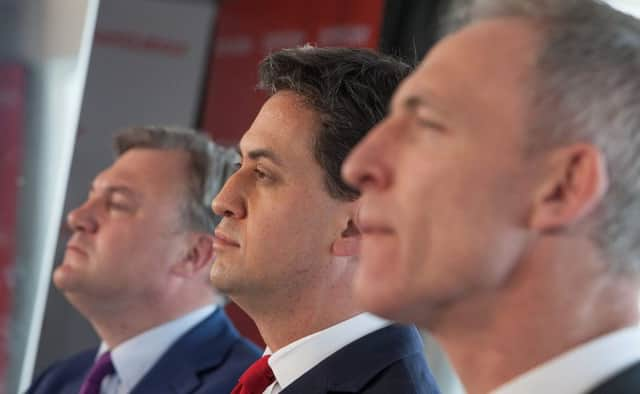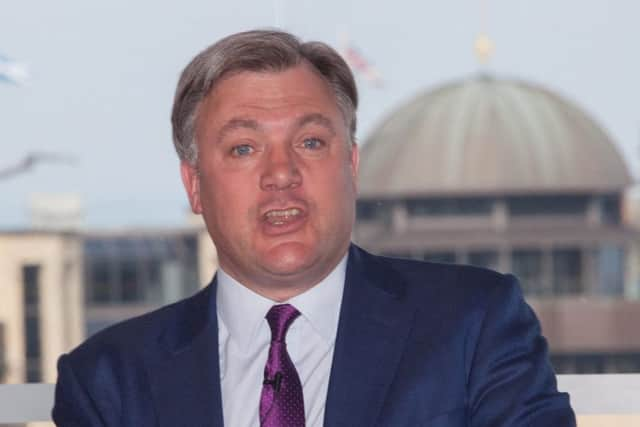Jim Murphy and Ed Balls ‘at odds’ over Labour cuts


With the SNP lead widening in the polls to 28 per cent, the shadow Chancellor’s comments seemed to contradict the Scottish Labour leader who had promised no cuts with the Nationalists claiming Mr Balls had “demolished Scottish Labour’s campaign”.
But the Labour leadership was unapologetic to Scottish voters who are being drawn to an SNP manifesto which calls for public spending to be increased by £180 billion in the next five years.
Advertisement
Hide AdAdvertisement
Hide AdAnd in a further twist shadow business secretary Chukka Umunna appeared to tell Mr Murphy to know his place.
Speaking on BBC’s Daily Politics, Mr Umunna said: “The leader of the Scottish Labour party will not be in charge of the UK budget.
“The leader of the country, the next Prime minister, Ed Miliband, will be in charge of the UK budget.”
Meanwhile, Mr Balls appeared to be taking on the Tory campaign message in England that a Labour government would funnel extra money to Scotland to buy votes from SNP MPs who could make up 56 of the 59 from Scotland.


At the manifesto launch Labour leader Ed Miliband said that Scots “face a choice” between a Labour government which will “create a fair economy”, a Tory government “whose priorities are wrong” and the SNP “who want to cut an extra £7.6 billion” from Scottish spending to introduce full fiscal autonomy.
In an interview Mr Balls said that the party’s proposal for a Mansion Tax on homes worth £2 million or more would deliver £800 million for Scotland.
But he went on: “Whether or not the overall Scottish budget is cut depends upon whether or not that £800m, which is financed and extra, is more than or less than our unplanned cuts - and that will depend upon the scale of the unplanned cuts.
“I can’t say to Scotland that you’re going to be exempt from spending cuts in the unprotected areas but they’re sensible and they are absolutely in marked contrast to what the Tories are proposing - because they want to have double the spending cuts next year than last year - and also the SNP, because what we exposed last week is the SNP both won’t match our manifesto pledges but also their fiscal autonomy within the UK is actually fiscal austerity in the UK.
“It would mean a massive cut to spending in Scotland.”
Advertisement
Hide AdAdvertisement
Hide AdHowever, Mr Murphy had previously claimed that Labour would not need to make “further cuts to achieve our spending rules” in the next parliament.
SNP Deputy First Minister John Swinney said: “This is the biggest revelation of the election in Scotland so far – and this admission from Ed Balls has demolished Labour’s Scottish campaign strategy.
“For the last week, Jim Murphy has been ducking and diving trying to hide his party’s cuts plans – now Ed Balls has shone a light on Labour’s true intentions and blown a massive hole in his own party’s campaign.”
The row over Scottish spending came as questions were being asked about Labour’s central promise to reduce the deficit every year and not borrow anything extra for new policies.
Mr Miliband refused to say whether this included capital spending while Mr Umunna said it would.
The manifesto also was light on specific tax rises or spending cuts apart from promises to raise the highest rate for those earning £150,000 or more to 50p and to bring in a Mansion Tax.
The opening page of the 83-page manifesto states: “The first line of Labour’s first Budget will be: ‘This Budget cuts the deficit every year’.”
The “budget responsibility lock” not only requires every manifesto policy to be paid for without additional borrowing, but would also see legislation introduced to require all major parties to have their manifesto commitments independently audited by the Office for Budget Responsibility (OBR).
Advertisement
Hide AdAdvertisement
Hide AdThere are repeated mentions of the “cost of living crisis” in Labour’s economic plans, a phrase which has been challenged by opponents as the inflation rate has dropped.
Institute for Fiscal Studies director Paul Johnson said that because Labour had not indicated how quickly it intended to achieve its objective, it was unclear what spending cuts or tax rises would be needed.
“The big unknown on the Labour side is how fast they want to get there and therefore do they need significant spending cuts or tax rises at all,” he told BBC News.
“They are committed to getting a current budget balance - a current budget surplus - by the end of the parliament. That’s an entirely credible fiscal policy. But they continue to not to give us any sense as to how quickly they want to achieve that.
“That could involve significant spending cuts or tax rises over the next three years if they want to get there within the next three years, or it could actually involve no spending cuts in order to just achieve that by the end of the parliament.
“Whilst the ambition is an entirely sensible and credible one we have got no more details about the speed with which they want to achieve that.”
He said that with public sector borrowing running at more than £90 billion a year, it was setting an “extremely low hurdle” to say it would come down year on year.
Tory Chancellor George Osborne said: “Ed Miliband failed to provide a credible economic plan and nobody will be fooled.
Advertisement
Hide AdAdvertisement
Hide Ad“There were no new ideas for Britain, and if you read the small print independent experts like the IFS have confirmed he would run a deficit every year.
“That means more borrowing, more debt and higher taxes.
“Britain doesn’t want to go back to the chaos of the past, and tomorrow the Prime Minister will set out a clear plan full of new ideas for a brighter future.”
Tory chief whip and leading Scottish member of the front bench Michael Gove called Labour’s manifesto a “death bed conversion to fiscal responsibility.”
He added: : “It’s got no credibility at all. We know every page in Labour’s manifesto will be subject to sign off by Alex Salmond and Nicola Sturgeon.
“Labour cannot get into Downing Street except on the coattails of the Scottish National Party so every promise they make today is subject to veto or endorsement by the SNP.
“Labour proposals are not funded and they are not underwritten by the credibility of delivering a strong economy.”
Lib Dem Chief Secretary to the Treasury Danny Alexander said: “Labour is still struggling to face up to the economic facts of life. They still believe that you can borrow your way out of debt.
“They have no clear timetable to finish the job of balancing the books. They’ve opposed all Liberal Democrats have done to turn the economy around and their whole approach remains riddled with inconsistency.
Advertisement
Hide AdAdvertisement
Hide Ad“Every single economic prediction they have made has been wrong.”
Jonathan Isaby, Chief Executive of the TaxPayers’ Alliance, said: “Labour’s Budget lock is all well and good, but we remain thoroughly in the dark about how the party would actually eradicate Britain’s £90 billion deficit. None of the parties have shown any evidence that they’ll be able to find the necessary savings or indeed that they’re willing to make the tough choices they keep talking about. Taxpayers deserve better than the fantasy economics of wishing away the deficit without fully-costed spending reductions.”
FOLLOW US
SCOTSMAN TABLET AND MOBILE APPS